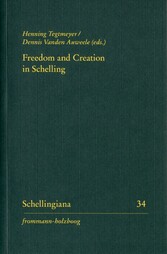Suchen und Finden
Service

Freedom and Creation in Schelling
Der vorliegende Sammelband enthält internationale Forschungsbeiträge zum Zusammenhang von Freiheit und Schöpfung in F. W. J. Schellings Spätphilosophie. Das in der Forschung gestiegene Interesse an Letzterer sowie die zunehmende Verfügbarkeit von Schellings Texten führt dazu, dass traditionelle Lehrmeinungen über den Charakter seiner Spätphilosophie hinterfragt oder gänzlich verworfen werden. Anstatt etwa seine Erlanger, Münchener und Berliner Philosophie als bloße Apologie eines orthodoxen Theismus zu interpretieren, fokussieren Forscher*innen auf die Entwicklung und die Kontinuitäten in Schellings Denken insgesamt. Der Schellings gesamte Philosophie prägende Zusammenhang zwischen dem Freiheitsbegriff und der Schöpfungslehre wird hier eingehend untersucht, in einer ausgewogenen Mischung aus Exegese, systematischer Rekonstruktion und philosophischer Analyse. This volume is dedicated to the exploration of the connection between freedom and creation in Schelling's late philosophy. It contains contributions of internationally renowned and younger Schelling scholars from several countries. The scholarly interest in Schelling's late philosophy has considerably increased during the last decades. Together with the rising number of available primary texts and translations, this has led, among other things, to a received scholarly view of Schelling's Erlangen, Munich, and Berlin years that partly challenges and partly rejects many claims of the older literature on Schelling. For example, his late philosophy is not conceived as a straightforward defence of orthodox theism anymore but seen within the context of his philosophical development, with a focus on the continuity between his early, middle, and late philosophy. The concepts of freedom and creation occupy a central position in these studies. The present volume examines the complex interrelations between these two concepts in detail, in a well-balanced combination of exegesis, systematic reconstruction and philosophical analysis.
Alle Preise verstehen sich inklusive der gesetzlichen MwSt.





